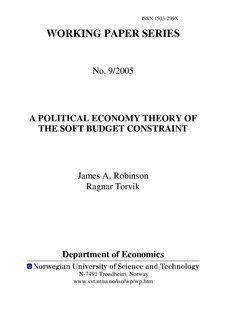| dc.contributor.author | Robinson, James A. | nb_NO |
| dc.contributor.author | Torvik, Ragnar | nb_NO |
| dc.date.accessioned | 2014-12-19T14:31:47Z | |
| dc.date.available | 2014-12-19T14:31:47Z | |
| dc.date.created | 2006-10-03 | nb_NO |
| dc.date.issued | 2005 | nb_NO |
| dc.identifier | 126065 | nb_NO |
| dc.identifier.uri | http://hdl.handle.net/11250/267095 | |
| dc.description.abstract | Why do soft budget constraints exist and persist? In this paper we argue that the prevalence of soft budget constraints can be best explained by the political desirability of softness. We develop a political economy model where politicians cannot commit to policies that are not ex post optimal. We show that because of the dynamic commitment problem inherent in the soft budget constraint, politicians canin essence commit to make transfers to entrepreneurs which otherwise they would not be able to do. This encourages such entrepreneurs to vote for them. Though the soft budget constraint may induce economic inefficiency, it may be politically rational because it influences the outcomes of elections. In consequence, even when information is complete, politicians may fund bad projects which they anticipate they will have to bail out in the future. | nb_NO |
| dc.language | eng | nb_NO |
| dc.publisher | Institutt for samfunnsøkonomi | nb_NO |
| dc.relation.ispartofseries | Working Paper Series, 1503-299X; 2005:9 | nb_NO |
| dc.title | A political economy theory of the soft budget constraint | nb_NO |
| dc.type | Research report | nb_NO |
| dc.contributor.department | Norges teknisk-naturvitenskapelige universitet, Fakultet for samfunnsvitenskap og teknologiledelse, Institutt for samfunnsøkonomi | nb_NO |
